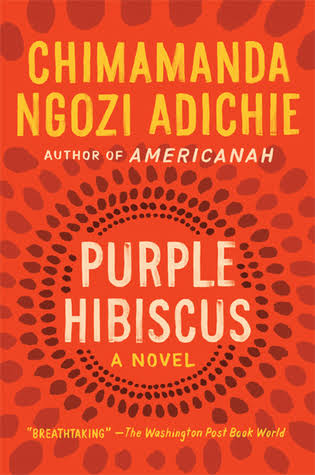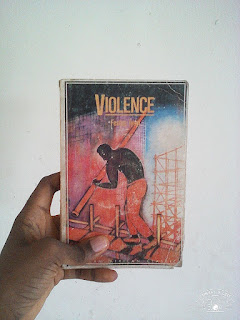REVIEW-ISH: PURPLE HIBISCUS, CHIMAMANDA ADICHIE
Howdy social distancers!! Please tell me you are at home 👀. While my last couple of posts have been centred around the COVID-19 situation, today’s post is a deviation from that. Many of us have been thrust into the rather unusual routine of daily living, and at times find it a bit hard to stay within the zone of sanity. For me though, isolation is not much of a big deal save for the fact that we can’t quite tell how long it would last. One of the things that helps me maintain my sanity in these times is getting lost in the fictional world of stories. Considering that I am making a conscious effort to read Literature this time around, I just got out of the world of Purple Hibiscus by Chimamanda Adichie.
Over time, I have come to appreciate Chimamanda Adichie’s story telling skills, that, and my memory seeming to tell me that I have encountered an excerpt from this book that I don’t quite remember led me to the embrace of Purple Hibiscus.
OVERVIEW
The plot is generally centred around Kambili and her family during the post-colonial, pre-democracy era. Eugene, her father is a devout catholic alongside his family, he is found constantly giving to the church and all manner of charitable acts, ascribing every success to God. However, he has his excesses, his temper drives him to hurting those he is said to love when they do wrong in his sight. He also practices Catholicism in the extreme, distancing himself and his children from his father who he constantly refers to as heathen due to his refusal to abandon his traditional religious beliefs.
Eugene is portrayed as a tough love kind of father, crafting time bound schedules for Kambili and Jaja--to the point that they seem to do nothing of their own will but only because the schedule said so-- because he thought it best for them to be best. The story primarily explores their family relations and beliefs (which eventually morphed after a short stay in Nsukka) through the eyes of Kambili who as a result finds it hard to function in a social capacity.
THOUGHTS
The book is the most plainly written book of Adichie's that I have read so far, communicating simply and quite well with the reader. The scenes are painted vividly, you don't need much imagination to feel the space or atmosphere that her words craft.
In the 100 plus pages, this book covers a wide range of themes. From politics (military rule), religion (extremism), to family, traditions, domestic abuse and even hypocrisy all interwoven to make the beautiful patchwork called the purple hibiscus. It was not necessarily a page turner for me--I left it for a while before finally completing it-- but still makes a good story when seen through till the end. I appreciate the realness of the characters and their dialogue, how for most part of the book, Kambili and Jaja didn't have to speak to communicate, how Amaka constantly riled Kambili with her comments, making mention of her status enabling her seeming inabilities. It also pushes the reality that there's always more to it than meets the eye, considering how Kambili's family was perceived from outside and what really went on in their lives.
I also find the structure of the story commendable, dividing the story into parts and making good use of flashback to lay the path to a beautiful story for us.
At the end of this book, I was left wondering why purple hibiscus? It was mentioned just like 3 times in the course of the book. I would like to believe the purple hibiscus signifies deviation from the what one has become used to. Almost like a metaphor for change, same way we are used to having red hibiscus. After Kambili and Jaja returned from spending time at Nsukka with Aunty Ifeoma, Jaja brings back some of the experimental purple hibiscus to be planted in their garden and only then did he begin to openly question what he had become accustomed to especially his father's relationship with his grandfather amidst extremist tendencies.
The characters are made so relatable, they grow on one easily. From Kambili's extremely silent self, Amaka's wisecracks, Aunty Ifeoma's optimism to Jaja's seeming rebellion, it is all so easy to conjure in one's mind as the story develops. Lastly, I sure didn't see the end coming. In all, even though I don’t score books this was a worthwhile read.
Over time, I have come to appreciate Chimamanda Adichie’s story telling skills, that, and my memory seeming to tell me that I have encountered an excerpt from this book that I don’t quite remember led me to the embrace of Purple Hibiscus.
OVERVIEW
The plot is generally centred around Kambili and her family during the post-colonial, pre-democracy era. Eugene, her father is a devout catholic alongside his family, he is found constantly giving to the church and all manner of charitable acts, ascribing every success to God. However, he has his excesses, his temper drives him to hurting those he is said to love when they do wrong in his sight. He also practices Catholicism in the extreme, distancing himself and his children from his father who he constantly refers to as heathen due to his refusal to abandon his traditional religious beliefs.
Eugene is portrayed as a tough love kind of father, crafting time bound schedules for Kambili and Jaja--to the point that they seem to do nothing of their own will but only because the schedule said so-- because he thought it best for them to be best. The story primarily explores their family relations and beliefs (which eventually morphed after a short stay in Nsukka) through the eyes of Kambili who as a result finds it hard to function in a social capacity.
THOUGHTS
The book is the most plainly written book of Adichie's that I have read so far, communicating simply and quite well with the reader. The scenes are painted vividly, you don't need much imagination to feel the space or atmosphere that her words craft.
In the 100 plus pages, this book covers a wide range of themes. From politics (military rule), religion (extremism), to family, traditions, domestic abuse and even hypocrisy all interwoven to make the beautiful patchwork called the purple hibiscus. It was not necessarily a page turner for me--I left it for a while before finally completing it-- but still makes a good story when seen through till the end. I appreciate the realness of the characters and their dialogue, how for most part of the book, Kambili and Jaja didn't have to speak to communicate, how Amaka constantly riled Kambili with her comments, making mention of her status enabling her seeming inabilities. It also pushes the reality that there's always more to it than meets the eye, considering how Kambili's family was perceived from outside and what really went on in their lives.
I also find the structure of the story commendable, dividing the story into parts and making good use of flashback to lay the path to a beautiful story for us.
At the end of this book, I was left wondering why purple hibiscus? It was mentioned just like 3 times in the course of the book. I would like to believe the purple hibiscus signifies deviation from the what one has become used to. Almost like a metaphor for change, same way we are used to having red hibiscus. After Kambili and Jaja returned from spending time at Nsukka with Aunty Ifeoma, Jaja brings back some of the experimental purple hibiscus to be planted in their garden and only then did he begin to openly question what he had become accustomed to especially his father's relationship with his grandfather amidst extremist tendencies.
The characters are made so relatable, they grow on one easily. From Kambili's extremely silent self, Amaka's wisecracks, Aunty Ifeoma's optimism to Jaja's seeming rebellion, it is all so easy to conjure in one's mind as the story develops. Lastly, I sure didn't see the end coming. In all, even though I don’t score books this was a worthwhile read.




Comments
Post a Comment